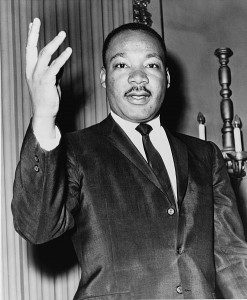
In observance of Martin Luther King, Jr. Day I’m presenting a revised version of a post from 2009 on my old Blogger site.
A query from Stephanie on the Ethical Witches list in Austin turned up this paper by Rev. Martin Luther King Jr. titled “The Influence of the Mystery Religions on Christianity.” King wrote it around the beginning of 1950 while he was a student at Crozer Theological Seminary in Pennsylvania.
King’s expertise was as a preacher and a civil rights leader, not as a historian or a theologian. The scholarship on which this student paper was based is now at least 60 years old – although to the best of my knowledge, nothing King put forward has been proven wrong. So there is little if anything in the paper that those of us with an interest in ancient paganism or in the historical origins of Christianity will find new. But the paper provides a fascinating look at the early thoughts of an amazing man.
King began by pointing out the religious diversity of the Greco-Roman world and noted that Christianity is far from the only religion with a dying and resurrected god:
It is not at all surprising in view of the wide and growing influence of these religions that when the disciples in Antioch and elsewhere preached a crucified and risen Jesus they should be regarded as the heralds of another mystery religion, and that Jesus himself should be taken for the divine Lord of the cult through whose death and resurrection salvation was to be had. That there were striking similarities between the developing church and these religions cannot be denied. Even Christian apologists had to admit that fact.
And he showed how the early Christians were influenced by other religions of their era – just as the early attempts at Pagan revivals in the 19th and 20th centuries were influenced by Christian thought and myth:
After being in contact with these surrounding religions and hearing certain doctrines expressed, it was only natural for some of these views to become a part of their subconscious minds. When they sat down to write they were expressing consciously that which had dwelled in their subconscious minds. It is also significant to know that Roman tolerance had favoured this great syncretism of religious ideas. Borrowing was not only natural but inevitable.
Religions arising at the same time and place are all responses to the same conditions. Sometimes they respond to those conditions in similar ways.
There can hardly be any gainsaying of the fact that Christianity was greatly influenced by the Mystery religions, both from a ritual and a doctrinal angle. This does not mean that there was a deliberate copying on the part of Christianity. On the contrary it was generally a natural and unconscious process rather than a deliberate plan of action. Christianity was subject to the same influences from the environment as were the other cults, and it sometimes produced the same reaction.
Despite the universalism implicit in most of the paper, in his conclusion King echoed a theme already quite old by the time he repeated it: that the imperfect pagan religions were only a preliminary step toward the “more perfect” Christian religion which replaced them. King said:
The greatest influence of the mystery religions on Christianity lies in a different direction from that of doctrine and ritual. It lies in the fact that the mystery religions paved the way for the presentation of Christianity to the world of that time. They prepared the people mentally and emotionally to understand the type of religion which Christianity represented. They were themselves, in varying degrees, imperfect examples of the Galilean cult which was to replace them.
The notes added by The Martin Luther King Jr. Research and Education Institute at Stanford (where King’s papers are archived) say the paper got an A.















